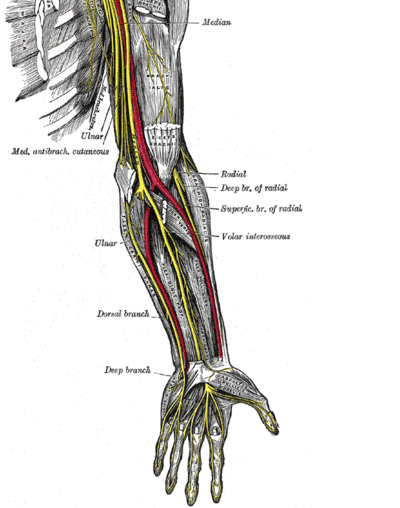Ulnar neuropathy
| Ulnar neuropathy | |
|---|---|
 | |
| Nerves of the left upper extremity. (Ulnar labeled at center) | |
| Classification and external resources | |
| Specialty | neurology |
| ICD-10 | G56.2 |
| ICD-9-CM | 354.2 |
| eMedicine | article/1141515 |
Ulnar neuropathy is a disorder involving the ulnar nerve. Ulnar neuropathy may be caused by entrapment of the ulnar nerve with resultant numbness and tingling.[1] Motor function can be assessed by testing for a positive Froment's sign, or making an OK sign (which the individual will be unable to do), little finger abduction can be tested as well.
Signs and symptoms
In terms of the signs/symptoms of ulnar neuropathy trauma and pressure to the arm and wrist, especially the elbow, the medial side of the wrist, and other sites close to the course of the ulnar nerve are of interest in this condition..Many people complain of sensory changes in the fourth and fifth digits. Rarely, an individual actually notices that the unusual sensations are mainly in the medial side of the ring finger (fourth digit). Sometimes the third digit is also involved, especially on the ulnar (medial) side. The sensory changes can be a feeling of numbness or a tingling, pain rarely occurs in the hand. Complaints of pain tend to be more common in the arm, up to and including the elbow area, which is probably the most common site of pain in an ulnar neuropathy.[2][3]
Causes
Among the causes of ulnar neuropathy are the following-
Pathophysiology
In regards to the pathophysiology of ulnar neuropathy:the axon, and myelin can be affected. Within the axon, fascicles to individual muscles could be involved, with subsequent motor unit loss and amplitude decrease. Conduction block means impaired transmission via a part of the nerve. Conduction block can mean myelin damage to the involved area, slowing of conduction or significant spreading out of the temporal profile of the response with axonal integrity is a hallmark of demyelination.[3][5]
Diagnosis

Among the diagnostic procedures done to determine if the individual has ulnar neuropathy are:[3][6][7]
- Nerve conduction exam/study (Nerve Conduction Velocity is a measurements made in a nerve conduction exam[8])
- Physical exam
- Medical history
- X ray
- CBC
- Urinalysis
- MRI
- Ultrasound
- Histology study
Treatment
Treatment for ulnar neuropathy can entail: NSAID (non-steroidal anti-inflammatory) medicines. there is also the option of cortisone. Another possible option is splinting, to secure elbow, a conservative procedure endorsed by some. In cases where surgery is needed, cubital tunnel release, were the ligament of the cubital tunnel is cut, thereby alleviating pressure on nerve can be performed.[6][9][10]
Prognosis
In terms of the prognosis of ulnar neuropathy early decompression of the nerve sees a return to normal ability (function). which should be immediate.Severe cubital tunnel syndrome tends to have a faster recovery process in individuals below the age of 70, as opposed to those above such an age. Finally, revisional surgery for cubital tunnel syndrome does not result well for those individuals over 50 years of age.[2]
References
- ↑ "Ulnar nerve dysfunction: MedlinePlus Medical Encyclopedia". medlineplus.gov. Retrieved 2016-07-22.
- 1 2 "Ulnar Nerve Disorders Free Medical Information | Patient". Patient. Retrieved 2016-07-23.
- 1 2 3 4 5 6 7 8 "Ulnar Neuropathy Clinical Presentation: History, Physical Examination, Ulnar neuropathy at elbow". emedicine.medscape.com. Retrieved 2016-07-23.
- 1 2 3 4 5 Thatte, Mukund R.; Mansukhani, Khushnuma A. (1 January 2011). "Compressive neuropathy in the upper limb". Indian Journal of Plastic Surgery : Official Publication of the Association of Plastic Surgeons of India. 44 (2): 283–297. doi:10.4103/0970-0358.85350. ISSN 0970-0358. Retrieved 23 July 2016.
- ↑ Robertson, Chad; Saratsiotis, John (June 2005). "A Review of Compressive Ulnar Neuropathy at the Elbow". Journal of Manipulative and Physiological Therapeutics. 28 (5): 345. doi:10.1016/j.jmpt.2005.04.005.
- 1 2 "Ulnar Nerve Entrapment at the Elbow (Cubital Tunnel Syndrome)-OrthoInfo - AAOS". orthoinfo.aaos.org. Retrieved 2016-07-23.
- ↑ Benatar, Michael. Neuromuscular Disease: Evidence and Analysis in Clinical Neurology. Springer Science & Business Media. p. 291. ISBN 9781597451062. Retrieved 23 July 2016.
- ↑ "Nerve conduction velocity: MedlinePlus Medical Encyclopedia". medlineplus.gov. Retrieved 2016-07-23.
- ↑ "Treatment for ulnar neuropathy at the elbow | Cochrane". doi:10.1002/14651858.CD006839.pub3.
- ↑ Frontera, Walter R.; Silver, Julie K.; Jr, Thomas D. Rizzo. Essentials of Physical Medicine and Rehabilitation. Elsevier Health Sciences. p. 135. ISBN 9780323222723. Retrieved 23 July 2016.
Further reading
- "NIOSHTIC-2 Publications Search - 20045060 - Do comorbid ulnar symptoms or ulnar neuropathy affect the prognosis of workers with carpal tunnel syndrome?". www.cdc.gov. Retrieved 2016-07-22.
- Yoon, Joon Shik; Walker, Francis O.; Cartwright, Michael S. (1 February 2010). "Ulnar Neuropathy With Normal Electrodiagnosis and Abnormal Nerve Ultrasound". Archives of physical medicine and rehabilitation. 91 (2): 318–320. doi:10.1016/j.apmr.2009.10.010. ISSN 0003-9993. PMC 2892824
 .
. - Warner, Mark A.; Warner, David O.; Matsumoto, Joseph Y.; Harper, Michel C.; Schroeder, Darrell R.; Maxson, Pamela M. (1 January 1999). "Ulnar Neuropathy in Surgical Patients". The Journal of the American Society of Anesthesiologists. 90 (1): 54–59. ISSN 0003-3022. Retrieved 23 July 2016.
External links
- "DMOZ - Health: Conditions and Diseases: Neurological Disorders: Muscle Diseases: Reflex Sympathetic Dystrophy". www.dmoz.org. Retrieved 23 July 2016.